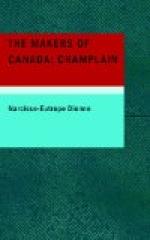The Indians were Madame Champlain’s special care, but she was respected by the French as well. We do not know very much about her social intercourse with the different families of Quebec, but it is not probable that she ignored Madame Hebert or her family, as Faillon seems to believe. Her own distinction and the position of her husband would, no doubt, render her particular in the choice of friends, but we can scarcely believe that she would completely ignore Madame Couillard, who was of her own age. How was it that she consented to live alone in Quebec during the long absence of her husband?
After her return to Paris in 1624, Madame Champlain lived alone, and became more and more detached from the world, till she asked her husband to allow her to enter an Ursuline convent. Champlain, fearing that this desire might arise rather from caprice than a vocation for the life of the cloister, thought it advisable to refuse her request, and he bade her a last adieu in 1633. After Champlain’s death, Father Le Jeune informed her that she was now free to follow the dictates of her heart.
According to the marriage settlement, Champlain was obliged to leave to his wife, if she were still living, all his possessions. By his last will, however, he left all his property to the church. Champlain had no desire to injure his wife by this act; on the contrary, he knew that her piety was great, and that she would probably applaud the course he had taken, which was owing to his extraordinary devotion to Notre Dame de la Recouvrance, the church which he had built and loved. Madame Champlain, in fact, made no opposition, and the will was confirmed on July 11th, 1637. The will, however, was contested by Marie Camaret, a first cousin of Champlain, and wife of Jacques Hersault, comptroller of customs at La Rochelle, and a famous trial was the result. The will was contested on two grounds: (1.) That the will was contrary to the marriage settlement, and therefore ought to be annulled; (2.) That the will was made by foreign hands, as it was difficult to suppose that Champlain had chosen the Virgin Mary as his heir.
These were the contentions of Master Boileau. The attorney-general Bignon easily refuted the second allegation by proving that Madame Champlain had recognized the signature of her husband, and had stated that the expression and style were his. The terms of this bequest to the Virgin were quite natural to a man of Champlain’s character, “When we know,” said the attorney, “that he frequently made use of Christian expressions in his general conversation.”
Although the authenticity of the will was proved, the attorney-general argued that it ought to be set aside in face of the deed of settlement. The court upheld this view, and the property of Champlain, with the exception of the sum of nine hundred livres, derived from the sale of his chattels, returned to his natural heirs.




